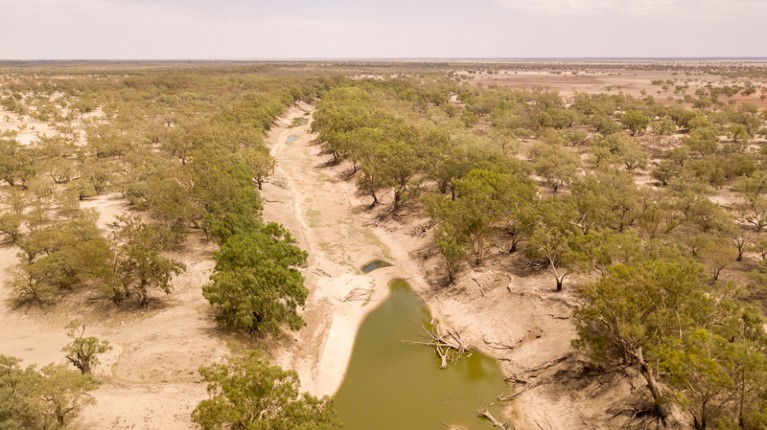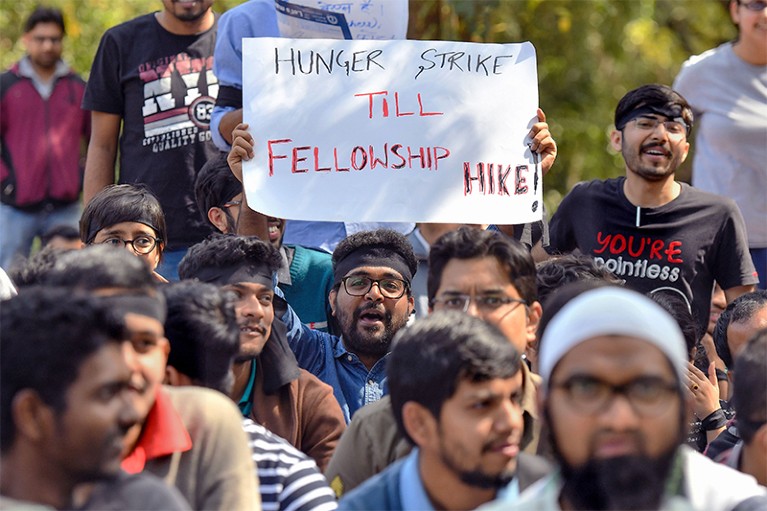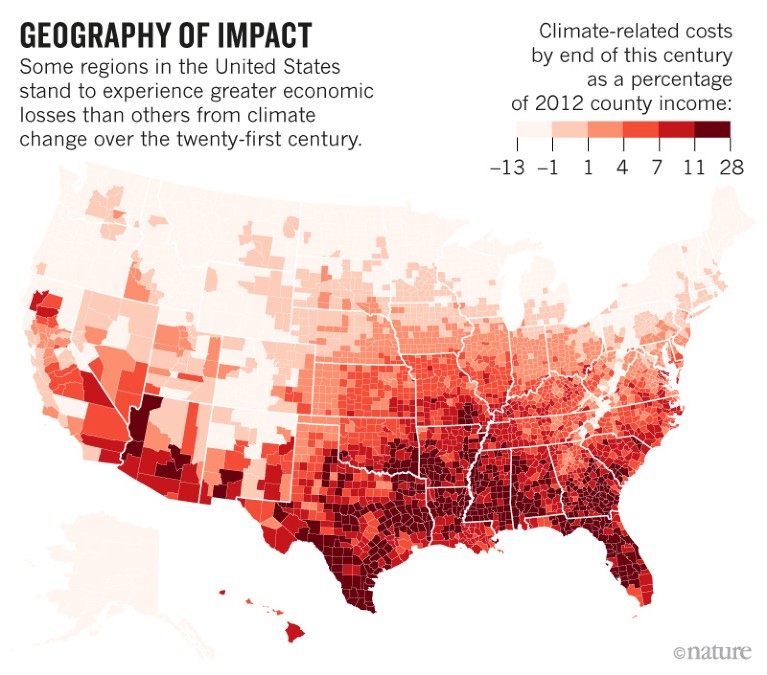EVENTS
Australian river management ‘negligent’ An independent inquiry into the management of Australia’s troubled Murray–Darling Basin river system has delivered a scathing report, accusing the agency responsible of mismanagement and negligence. A royal commission was established last year by the state of South Australia, where the Murray River ends, to review the state and national legislation and policies that manage how water is shared in the country’s largest basin. In his report released on 31 January, commissioner Bret Walker, a barrister in Sydney, wrote that “politics rather than science” had driven the setting of limits on how much water could be taken from the river system for uses such as agriculture. He also noted that the Murray–Darling Basin Authority — the statutory agency established by the national government in 2007 to manage the basin’s water resources — was extremely secretive. South Australian premier Steven Marshall said that his government would consider the report’s recommendations. The Murray–Darling Basin Authority issued a statement denying that it had acted improperly or unlawfully.

Low levels of water in the lower Darling River are causing problems for local communities.Credit: Jenny Evans/Getty
FUNDING
Research exercise The rules for the United Kingdom’s next audit of academic research have been published. The exercise, which is performed every seven years, helps university funding agencies to decide how to distribute their £2-billion (US$2.6-billion) pot for research. The evaluation is known as the Research Excellence Framework (REF) and aims to assess the quality of research at each university. One of the most significant changes for the 2021 exercise is that institutes must include all research staff in the assessment, according to guidance documents issued on 31 January by Research England, which manages the REF. During the 2014 exercise, university managers could pick which scientists to submit; critics say that this could have allowed them to manipulate the process to get the best scores.
POLITICS
Macedonia deal A political agreement between Greece and its northern neighbour, the Republic of Macedonia, ends a long-standing dispute over the republic’s name and sets the stage for renewed cross-border collaboration in research and higher education. Ratified by the Greek parliament on 25 January, the Prespa Agreement renames the Republic of Macedonia as the Republic of North Macedonia. The two nations have been at loggerheads for decades over the Republic of Macedonia’s name because Greece has a northern region called Macedonia. The accord ends the political stand-off and opens up opportunities for cooperation, including in science, which is one of the areas specifically mentioned in the agreement. “Scientific diplomacy is an effective tool that can strengthen the relations between Greece and North Macedonia, as well as the Western Balkans in general,” says Greek research minister and laser physicist Costas Fotakis, in Athens. He notes that biomedicine, agrobiology, energy and the environment are all areas in which the two nations could share research infrastructure and exchange expertise. A spokesperson for the Republic of Macedonia’s science ministry told Nature they hope the agreement will lead to a formal, detailed deal on scientific and technological cooperation between the two countries.
POLICY
Africa drug approval Authorities in the Democratic Republic of the Congo approved the first oral treatment for sleeping sickness on 30 January, paving the way for authorization of the drug elsewhere in Africa. Sleeping sickness, or human African trypanosomiasis, causes psychosis and severe disruptions of sleep patterns, and is usually fatal if left untreated. The World Health Organization (WHO) recorded nearly 1,500 cases of the disease, which is endemic to sub-Saharan Africa, in 2017. The oral drug, fexinidazole, is easier to administer than previous treatments — which required either 14 or 56 intravenous infusions — especially in poor and conflict-ridden areas. The European Medicines Agency recommended fexinidazole, developed by the Drugs for Neglected Diseases initiative in Geneva, Switzerland, and drug-maker Sanofi in Paris, in November 2018. The WHO hopes to eliminate sleeping sickness by 2020.
Payment hike The Indian government announced last week that it will increase the stipend for PhD students who have qualified for a research fellowship, by up to 25%. About 60,000 graduate students will now receive 31,000 rupees (US$435) per month for the first 2 years of their fellowship, up from 25,000 rupees per month, and then 35,000 rupees a month thereafter, up from 28,000 rupees. But the news was greeted with derision by students, who had been pushing for an 80% increase. Since October 2018, they have held regular protests and more than 2,000 students have undertaken a ‘relay’ hunger strike (pictured). They say that the current payments are too low and arrive irregularly, making it difficult to meet living expenses.

Research students take part in a hunger strike in Bangalore, India in January. They called for an increase to fellowship stipends.Credit: Manjunath Kiran/AFP/Getty
Foreign recruitment The US Department of Energy (DOE) has banned its employees and contractors, including laboratory personnel, from participating in talent-recruitment programmes sponsored by governments that the agency deems sensitive. In a memo issued on 1 February, the DOE said that the policy seeks to stop the unauthorized transfer of technology and intellectual property to foreign governments. “Unfortunately, some foreign government-sponsored talent recruitment programs have taken advantage of America’s openness to collaboration to infiltrate our labs, steal our technology and use our own resources against us,” said a DOE spokesperson. “We can no longer allow these programs to operate within our scientific community at the expense of our own national interest.”
FACILITIES
ITER leadership The director-general of the international nuclear-fusion experiment ITER, Bernard Bigot, has been reappointed to a second five-year term, to begin in 2020. The 28 January announcement by the ITER council strongly endorses Bigot’s work. Construction of ITER’s US$22-billion tokamak reactor — a magnetic device designed to prove the feasibility of fusion in energy production — in Saint-Paul-lez-Durance in southern France had faced major delays. But it has been on schedule since Bigot first got the job in 2015, the lab says. The first phase is now 60% complete; plasma is expected to circulate inside the machine by 2025. When finished in 2035, ITER will be the world’s largest experimental fusion facility.
Neutrino hunt The Super-Kamiokande neutrino detector at Kamioka lab near Hida, Japan, resumed taking data on 29 January, after an eight-month-long shutdown for maintenance. The work required draining the detector’s tank of 50,000 tonnes of ultra-purified water, and re-sealing 6 kilometres of seams between the steel slabs that make up the tank, where small leaks had developed over more than two decades of operation. The Japanese- and US-led project measures neutrinos from the Sun and other stars, as well as monitoring the water for the possible decay of protons, which has never yet been observed. It will also resume experiments with a neutrino beam produced by a particle accelerator.
PUBLISHING
Elsevier access The University of California library system has extended its negotiations with publisher Elsevier on a new licensing agreement, for the second time. The two parties failed to come up with a deal that incorporates open-access publishing fees into subscription costs for the system’s ten libraries. The library consortium’s existing contract with Elsevier expired on 31 December. Talks were extended until 31 January and are continuing. The situation is similar in Norway, where a national library consortium also failed to sign a new contract with Elsevier before its current, and already extended, contract expired on 31 January. Talks have resumed there, too, and in both countries researchers can still access the latest Elsevier journal articles. Meanwhile, academics in Hungary, Sweden and most of Germany can no longer do so, after negotiations with the publisher broke down in 2018. Elsevier says that it is committed to reaching an agreement in all these cases.
TREND WATCH
The bulk of the economic burden of climate change in the United States this century will fall on Republican strongholds, where politicians have historically opposed climate policies, says an analysis released on 29 January by the Brookings Institution, a think tank in Washington DC. Researchers compared the projected economic impacts of global warming — including changes in mortality, agricultural yields and coastal damage driven by, for example, extreme weather and rising seas — with recent US voting patterns. They found that vast swathes of the Republican-leaning southwest and southeast could see economic losses of 10–28%. By contrast, Democratic-leaning northern states might experience fewer impacts, and could even benefit from some of climate change’s effects, including increased agricultural yields. The US states at most risk are part of a “barricade” that opposes action to curb greenhouse-gas emissions, says co-author David Victor, a political scientist at the University of California, San Diego. “The politics are flipped upside down,” Victor says. But, he adds, economic impacts might help to persuade conservative voters of the need to curb emissions.

Source: Brookings Institution






